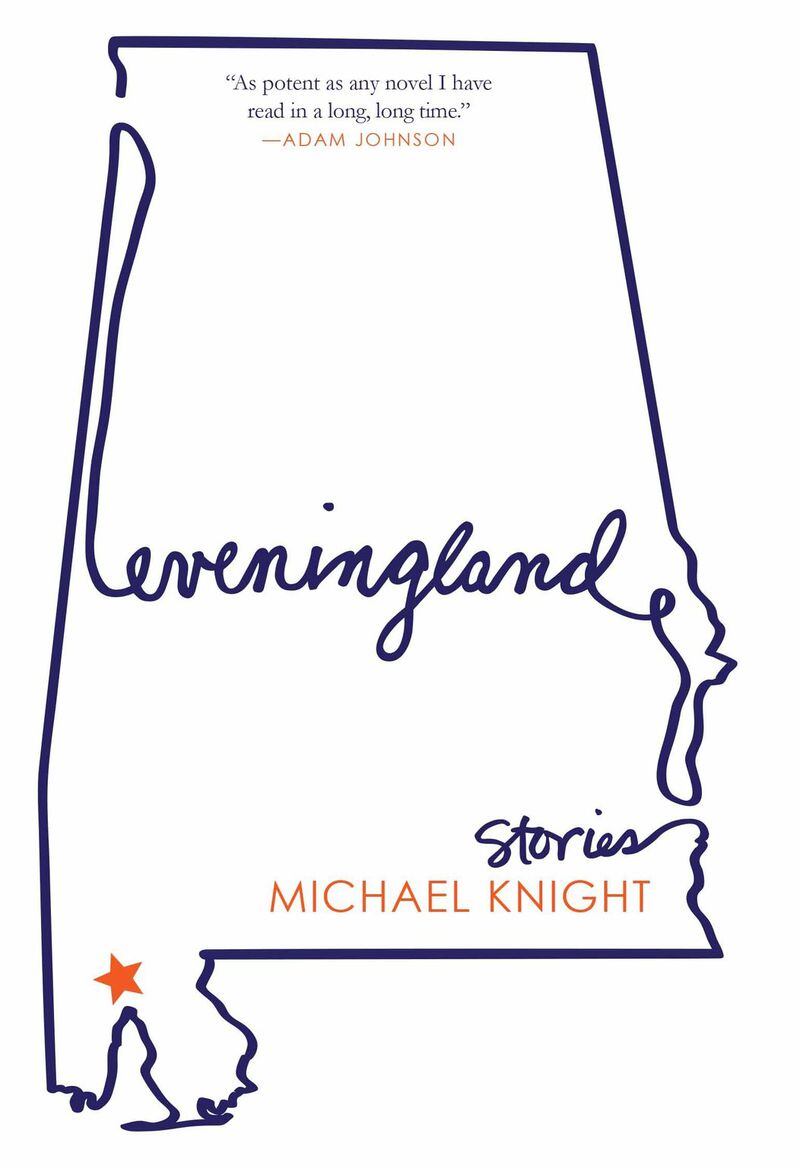Michael Knight has a gift for muscular opening lines. “Water and Oil,” the first story in his latest collection, announces the anthology’s intentions with a dash of Dickens: “None of this is true. All of this is true.”
The paradoxical statement may sound like an indictment of modern politics, but the “alternative facts” divulged throughout “Eveningland” emerge instead from matters personal and environmental. In six polished stories and a novella itching to fill a hundred more pages, Knight plunges into the secret ambivalences experienced by residents of Mobile, Ala., his hometown. Widowers and divorcees figure prominently, individuals forced to reconcile harsh truths with false expectations.
The collection’s title is referenced in an epigraph from Walker Percy’s “The Moviegoer”: “It should be quite a sight, the going under of the evening land.” An earlier passage from that scene in the novel puts a finer point on one of Knight’s central themes. “I no longer pretend to understand the world,” says Binx’s aunt. “The world I knew has come crashing down around my ears. The things we hold dear are reviled and spat upon.”
Henry Rufus Bragg, the 17-year-old hero of “Water and Oil,” arrives at a similar sort of resentment, suspecting “that everything had been ruined before he was ever born.” His coming-of-age story takes place during 2010’s Deepwater Horizon calamity. Bragg volunteers to monitor Mobile Bay for incoming oil slicks. “Handsome but in an unfinished way,” the boy has a fondness for knock-knock jokes and a killer crush on a trashy waitress at his dad’s marina.
Cynics may wonder how an advantaged jock like Bragg could remain so tender-hearted. Knight, who teaches creative writing at the University of Tennessee, splashes cold water on those questions by way of a risky narrative device. If the boy seems too good to be believable, it’s because this dewy-eyed account of Bragg’s last golden summer comes from a lonely old widower who lives at the marina. The nameless first-person narrator pretty much vanishes as Bragg’s awkward lesson in heartbreak unfolds.
His reemergence adds umbrage to the bittersweet finish. “All of this is pure conjecture,” the narrator admits, “the boy’s life unspooling while I puttered on my boat … clouds racing past like time itself, each of us, every minute, a little closer to the end, not unhappy but nagged sometimes by the unspeakable misgivings of contentment.”
Readers can’t cry foul over the storyteller’s intentional opaqueness: After all, he warned us at the beginning.
Lies and subtle deceptions propel the action in the majority of Knight’s stories, with mixed results. The strange and funny “Smash and Grab” tests the boundaries of credulity and empathy. It’s hard to pity Cashdollar, a burglar who targets the wrong house on New Year’s Eve, but harder to relate to the teenager who lives there. After smacking the intruder with a toilet tank lid, Daphne duct-tapes him to a chair and finishes painting her nails. She dishes about swigging cough syrup and her absent father’s infidelities, then confesses that some parts were made up.
When the cops arrive, Daphne concocts an improbable alibi that adds more weirdness to the disturbing situation. The abrupt conclusion counts as tidy when compared to the riddles elsewhere in “Eveningland.” Knight may have a knack for first lines, but his endings tend to land like kidney punches.
“Grand Old Party,” a slapstick farce concerning an irate shopkeep who threatens his wife and her lover with a shotgun, escalates to a tense, hilarious climax. It’s a far cry from the fizzle in “Jubilee,” a richly rendered portrait of a yuppie couple organizing the husband’s 50th birthday party. The guest list drops the names of characters from other stories, cameos that feel inconsequential in a voyeuristic plot devoid of friction.
In the collection’s most perplexing piece, “Our Lady of the Roses,” Hadley Walsh enjoys teaching art at a poor Catholic school — until one of the nuns suggests the assignments should be “of a more liturgical nature.” The chilly reprimand coincides with a sudden onset of cold feet as Hadley learns that her boyfriend may be planning to pop the question.
What begins with a lightweight rom-com setup veers into vague hysteria once the nun opens up about the horrors she endured in her home country. Hadley, a lapsed Catholic, claims she “had always been intrigued by the way randomness could hint at meaning,” yet chance disruptions in her life trigger a full-blown crisis of faith. “The truth was she didn’t believe in a God who demanded her adoration. She believed in mystery.” The story makes good on the assertion, perhaps, by closing with an undisclosed epiphany.
“Landfall,” the twisty novella that ends “Eveningland,” revisits many of the book’s emotional refrains (angsty wistfulness, buried grief, bewilderment) while working extra hard to eliminate predictability. Its zigzagging storyline follows members of a shipbuilding family preparing for a hurricane. Knight frequently darts between storylines, each scene a new catastrophe. Fidgety matriarch Muriel has a freak accident in the bathroom; her son Angus embarks on a dangerous mission to save a fishing vessel; his estranged older brother braves a fraught journey home — all before the storm hits.
Yet in the midst of the chaos, “Landfall” finds space for fleeting moments of clarity. Muriel’s daughter ponders “how closely her mother’s expectations of her life reflected the end result.” Seasick Angus has a similar thought about himself and his insight “even as a 13-year-old … that this was the path his life would take, and that knowledge felt less like pressure than fate.”
In the wake of November’s election, a ubiquitous narrative emerged regarding the establishment’s lack of listening to the disgruntled working class. “Eveningland” gives voice to a different segment of voters: aging, well-heeled whites who toe the party line. We witness characters reacting to a world that’s vanishing before their eyes, replaced by a frightening terrain of foreigners, robbers and female police officers. It’s challenging to muster sympathy for spiteful ignorance, but perhaps not so difficult to understand how societal upheaval can leave folks in muted panic as daylight fades and an imagined storm inches closer toward shore.
FICTION
‘Eveningland’
By Michael Knight
Grove Atlantic
$25, 288 pages








